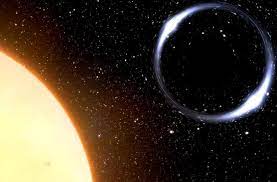Closest Black Hole to Earth Discovered in Our Cosmic Backyard: A New Era Begins

Closest Black Hole to Earth Discovered in Our Cosmic Backyard: A New Era Begins– Scientists have made a significant astronomical discovery by identifying the nearest black hole to our planet, which is located nearby in space. This remarkable discovery presents new prospects for studying these mysterious entities and comprehending their impact on the structure of the cosmos.
Discovery of the black hole BH1:
Astronomers used the European Space Agency’s Gaia satellite to detect a black hole known as BH1. The black hole has been located within a distance of only 1,000 light-years from Earth, which is the closest proximity that any black hole has ever been found. The Gaia satellite was built to precisely measure the movements and positions of stars in the Milky Way galaxy.
April 2023 Current Affairs Quiz
What is a black hole?
Black holes are incredibly dense objects that are formed when massive stars collapse under the force of their own gravity. They are so dense that their gravity is strong enough to trap anything that comes too close, including light itself. This makes them invisible to telescopes, which can only detect the effects of their gravity on nearby matter.
Why is this discovery so significant?
The discovery of BH1 is significant because it enables scientists to study a black hole in great detail. By observing the effects of its gravity on nearby stars and gas, astronomers can learn more about the properties and behavior of black holes. This, in turn, can help us understand how they form, grow, and interact with their surroundings.
Aside from BH1, the Gaia satellite discovered another black hole known as Gaia BH2, which is approximately 15,000 light-years from Earth. These two black holes have the most widely separated orbits of all known black holes, with BH1 orbiting around a companion star once every 6.7 days and Gaia BH2 taking about 7.6 years to complete a single orbit.
The discovery of BH1 and Gaia BH2 is just the beginning of what promises to be an exciting new era of black hole research. With the help of advanced telescopes and satellites, astronomers are poised to unlock the secrets of these mysterious objects and gain new insights into the workings of the universe.